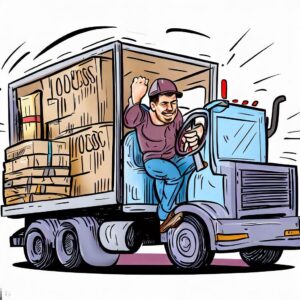How to have a successful trucking business? As a business owner, you are aware of the significance of operating a successful trucking business. With the growth of e-commerce and online retail, there has been an amplified demand for transportation and logistics services. However, launching and sustaining a lucrative trucking business requires more than just owning a few trucks and hiring drivers. In this article, we have provided tips that can help you achieve success in the trucking industry. By following these guidelines, you can increase your chances of profitability, longevity, and a positive reputation within the industry.
1 – Develop a Business Plan
Developing a comprehensive business plan is an essential step in starting a successful trucking business. Your business plan should outline all the critical elements of your company, including your objectives, strategies, financial projections, and competition analysis. A well-crafted business plan provides a roadmap for success by helping you identify potential challenges and set realistic goals.
When developing your business plan, it’s important to take into consideration what sets your trucking business apart from competitors. You should also analyze market trends and target audience demographics to ensure that your business is positioned to meet current and future demand. Additionally, financial projections should be based on thorough research and realistic expectations of revenue and expenses.
The Small Business Administration (SBA) offers a free guide to writing a business plan that can be found on their website. This guide is a valuable resource that can help you create a professional, detailed business plan that accurately reflects your goals and objectives. It includes templates and examples that make the process easier and more accessible.
Developing a comprehensive business plan is crucial to the success of your trucking business. It provides a clear understanding of your objectives, strategies, and financial projections and helps you identify potential challenges and set realistic goals. By utilizing resources such as the SBA’s free guide to writing a business plan, you can create a professional, detailed plan that accurately reflects your vision for your trucking business.

2 – Obtain the Required Licenses and Permits
Obtaining the necessary licenses and permits is an essential step in establishing a successful trucking business. Without proper documentation, you risk being subjected to heavy fines and legal consequences that can harm your reputation and financial stability.
You will need to obtain several licenses and permits from the Federal Motor Carrier Safety Administration (FMCSA) and the Department of Transportation (DOT) before operating your trucking business. These include a USDOT number, which is a unique identifier that serves as a safety permit for commercial vehicles. In addition, you will need to acquire operating authority, which is a license granted by the FMCSA that allows you to transport goods across state lines. Finally, you must register for the International Registration Plan (IRP), which is a reciprocity agreement among states that allows carriers to travel between jurisdictions with one registration plate.
It’s important to note that obtaining these licenses and permits can be a complex process, and failure to do so correctly can lead to significant consequences. By working with a reputable consultant or attorney who specializes in trucking industry regulations, you can ensure that your applications for licenses and permits are accurate and complete. This can save you time, money, and potential legal issues in the long run.
Obtaining the required licenses and permits is a critical component of starting and running a successful trucking business. It’s crucial to understand the specific requirements and regulations set forth by the FMCSA and DOT and to work with a knowledgeable consultant or attorney to ensure that all documentation is complete and accurate. By taking the necessary steps to obtain the appropriate licenses and permits, you can establish a strong foundation for your trucking business and avoid costly fines and legal consequences.

3 – Invest in Quality Equipment and Maintenance
Investing in high-quality equipment and regular maintenance is crucial to the success of your trucking business. Your trucks and trailers are the backbone of your operations, and any issues with them can result in costly downtime and potential losses.
Purchasing new or used trucks with low mileage and a good service history can be an excellent investment that saves you time and money in the long run. New trucks come with the latest technology and safety features, while used trucks can offer significant cost savings without sacrificing quality.
To ensure that your equipment operates at peak performance, it’s important to implement a comprehensive preventive maintenance program. Regular inspections, oil changes, tire rotations, and other routine tasks can help prevent breakdowns and reduce repair costs over time. Additionally, using high-quality parts and fluids can prolong the life of your equipment and improve its reliability.
Working with a reputable mechanic or maintenance provider who specializes in trucking equipment can also be beneficial. They can help identify potential issues before they become major problems and offer guidance on how to best maintain your equipment.
Investing in high-quality equipment and regular maintenance is essential to the success of your trucking business. By purchasing new or used trucks with low mileage and implementing a comprehensive preventive maintenance program, you can minimize downtime and costly repairs. Working with a knowledgeable mechanic or maintenance provider can also provide valuable insights into how to best maintain your equipment for optimal performance.

4 – Hire Qualified Drivers
Hiring qualified and skilled drivers is a critical factor in ensuring the success of your trucking business. Your drivers are the face of your company, and their performance can significantly impact your reputation and bottom line.
To ensure that you hire the best possible drivers, it’s essential to establish clear hiring criteria. This includes requiring a valid Commercial Driver’s License (CDL) and an excellent driving record with no accidents or incidents. You may also want to consider drivers’ experience, including the number of years they have been driving and their familiarity with specific types of cargo.
Conducting thorough background checks, drug screenings, and road tests is also crucial. These measures help ensure that potential hires are qualified, reliable, and trustworthy. Background checks should include criminal history, employment history, and driving records. Drug screenings help ensure that drivers are not under the influence of drugs or alcohol while on the job. Road tests provide insight into how potential hires perform on the road and whether they adhere to safety regulations and protocols.
Additionally, ongoing training and education for drivers can improve their skills and performance. Providing regular training on safety procedures, new technologies, and industry-specific knowledge can help keep your drivers up-to-date on trends and regulations.
Hiring qualified and experienced drivers is fundamental to the success of your trucking business. Establishing clear hiring criteria, conducting thorough background checks and drug screenings, and providing ongoing training and education can help ensure that your drivers are reliable and skilled. By prioritizing driver qualifications and investing in their ongoing development, you can maintain a strong reputation and achieve long-term success.

5 – Implement Efficient Logistics and Operations
Efficient logistics and operations are critical to the success of your trucking business. By optimizing your transportation process, you can improve customer satisfaction, reduce costs, and increase profitability.
One way to achieve efficient logistics and operations is by implementing transportation management software (TMS). A TMS system can help you plan routes, track shipments, and manage inventory in real-time. This can help you streamline your processes, reduce manual errors, and provide better visibility into your operations.
To further optimize your fleet’s performance, consider using technology such as GPS tracking and automated dispatch systems. GPS tracking allows you to monitor your trucks’ movements and identify potential issues that could impact delivery times. Automated dispatch systems can help you assign drivers and vehicles more efficiently, reducing idle time and improving overall productivity.
Efficient loading and unloading procedures can also improve your operations. Use standardized processes and equipment to minimize delays and ensure consistency. Additionally, consider investing in technologies such as automated loading and unloading systems, which can save time and reduce the risk of injury.
Finally, optimizing fuel efficiency can significantly impact your operating costs. Consider implementing fuel-saving measures such as route planning and optimization, driver training, and vehicle maintenance programs. These measures can help reduce fuel consumption and lower emissions, benefiting both your business and the environment.
Implementing efficient logistics and operations is crucial to running a successful trucking business. By utilizing transportation management software, GPS tracking, and automated dispatch systems, you can streamline your processes and improve visibility into your operations. Efficient loading and unloading procedures and fuel-saving measures can also contribute to increased profitability and customer satisfaction.

6 – Maintain Compliance with Regulations
Maintaining compliance with regulations is crucial to the success and longevity of your trucking business. The trucking industry is heavily regulated, and failure to comply with regulations can result in significant financial losses, legal consequences, and damage to your reputation.
To ensure you stay compliant with regulations, it’s essential to stay up-to-date with the latest Federal Motor Carrier Safety Administration (FMCSA) and Department of Transportation (DOT) guidelines and regulations. This includes familiarizing yourself with hours-of-service rules, electronic logging device (ELD) requirements, safety inspections, and driver qualifications.
Hours-of-service rules govern the time drivers are allowed to operate their vehicles and require them to take mandatory rest breaks. ELDs help ensure that drivers adhere to these rules by automatically logging their driving hours.
Safety inspections are also an important part of regulatory compliance. Regular inspections help ensure that your trucks and trailers meet safety standards, reducing the risk of accidents and injuries. Additionally, conducting thorough background checks, drug screenings, and road tests before hiring any drivers can help ensure that they meet FMCSA and DOT qualifications.
Finally, staying compliant with regulations requires ongoing education and training. By keeping up-to-date with changes in regulations and providing training to your employees, you can remain compliant and avoid costly fines or penalties.
Maintaining compliance with FMCSA and DOT regulations is a crucial part of running a successful trucking business. Stay up-to-date with the latest guidelines, conduct regular safety inspections, and invest in ongoing employee education and training. By prioritizing regulatory compliance, you can protect your business and maintain a positive reputation within the industry.

Conclusion
In conclusion, building and maintaining a successful trucking business requires a combination of careful planning, investment in quality equipment, hiring qualified drivers, implementing efficient logistics and operations, and maintaining compliance with regulations.
By following these tips, you can increase your chances of achieving long-term success and profitability in the trucking industry. For more detailed information on starting and managing a trucking business, visit the Small Business Administration (SBA) website and the Federal Motor Carrier Safety Administration (FMCSA) website. These resources provide valuable guidance and support for entrepreneurs looking to establish or grow their trucking businesses.

